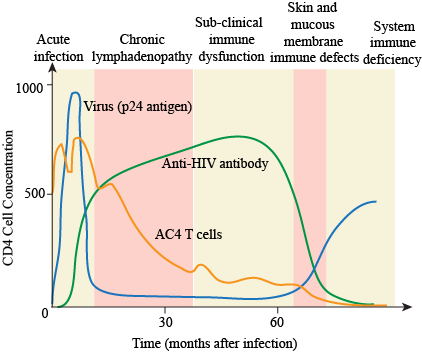Common Mistakes
Virus Classification
Many people think that viruses are bacteria and don’t really understand the differences between the two. This situation is even the case for some doctors. Your body registers a fever when it is mounting an immune response to a viral infection (see our sections on immune response for details). Many doctors still prescribe antibiotics for fevers, but unfortunately, antibiotics only target bacteria and don’t do anything for viruses.Now you know and can inform your doctor that you know a virus is a small particle that is usually less than 200 nm in diameter and doesn’t respond to antibiotics. Alternatively, you can say, "Get away from me you quack!"*
*Totally, completely kidding. Shmoop would like to apologize for that last joke. It was in poor taste and disrespectful to the many hours that medical doctors spend in school. We have destroyed PunBot3000 and replaced it with a team of college philosophy majors.
Virus Replication
Budding may be a difficult concept to understand. If you have ever watched Star Trek or one of those space movies, budding occurs when a space pod leaves a spaceship or space station. You basically have a little self-contained unit escaping a larger body. Unlike lysis, budding does not destroy the cell. However, if enough virions are budding out of the cell, the cell will run out of membrane and die.How do you know whether a virus will fuse with the cell membrane or in an endosome? That is a difficult question to answer, and many scientists are still unsure whether a fusion glycoprotein functions at low pH or neutral pH. The problem is that some experiments will show one result with one cell type, and other experiments will show another result with another cell type. Depending on the virus and the cell type, it is unclear whether there is a low-pH-requirement or not for entry. Usually, though, there is a requirement for a receptor.
Immune Response to Viruses
When people get sick from a virus infection, they think the virus infection is responsible. Believe it or not, the symptoms you feel when you are sick are actually your body's way of fighting the infection. The fever and runny nose are products of "inflammation" because T and B cells are rapidly duplicating and heading into the site of infection to clear the virus.
Actually, when you feel the most sick is the time when you are the best off. By this point, the immune system has already cleared most of the virus from your body. The time when there is the most virus in our system, or before our immune system is active, is also the time that we are the most contagious. This period is called the prodromal phase, which is not to be confused with the prodormal phase experienced by college students who don’t want to leave their dorms.**
**Shmoop would again like to apologize for that last terrible joke. The writer of that joke has been fired and now works as a writer for a reality show about hairdressers with attitude in New Jersey.
Antiviral Treatments
Receiving a vaccine does not mean that you will be immune for life against a certain virus. The ability of a vaccine to generate immunity against a virus is based on the ability of that virus to mutate the site that is recognized by the immune system, called an antigenic site. If a virus can easily mutate its antigenic sites, then immunity is difficult to maintain. Therefore, viruses like influenza and HIV are difficult to target for vaccine therapies because they are constantly mutating. While polio mutates rapidly, it is limited in the amount of mutations it can make and still be a functional virus. Consequently, it is easy to develop a lifelong immunity against polio. Since smallpox is a DNA virus, it does not mutate as easily, and immunity is also preserved against it.As mentioned in our earlier section, most virus infections have already occurred before symptoms are detected. Therefore, most antiviral drugs are not effective as treatments against viruses. They are better taken as preventative measures. That is, if it is flu season, you would need to take anti-flu drugs every day to decrease the possibility of you getting an infection. This situation is not ideal unless you like taking drugs every day.